| Origem | Literatura Estrangeira |
|---|---|
| Quantidade de Páginas | 446 |
| Acabamento | Capa Comum |
| Autores | Michael C. Blumm |
| Idioma | Inglês |
| Edição | 0 |
| Selo | Vandeplas Publishing LLC |
 Vade Mecum DPE-MG (2ª Edição)
Vade Mecum DPE-MG (2ª Edição)
Editora GuedesJus
R$ 120,00 ou até 2x sem juros Vade Mecum MPPR (capa comum)
Vade Mecum MPPR (capa comum)
Editora GuedesJus
R$ 150,00 ou até 3x sem juros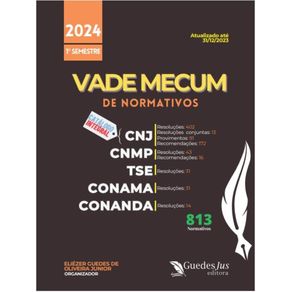 Vade Mecum CNJ-CNMP-TSE-CONAMA-CONANDA
Vade Mecum CNJ-CNMP-TSE-CONAMA-CONANDA
Editora GuedesJus
R$ 190,90 ou até 3x sem juros Oeuvres Complètes De Pothier
Oeuvres Complètes De Pothier
Legare Street Press
R$ 275,14 ou até 3x sem juros The Legal Design Book
The Legal Design Book
Ground M
R$ 365,81 ou até 3x sem juros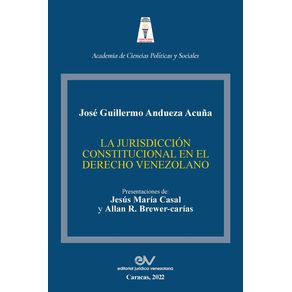 LA JURISDICCIÓN CONSTITUCIONAL EN EL DERECHO VENEZOLANO
LA JURISDICCIÓN CONSTITUCIONAL EN EL DERECHO VENEZOLANO
EDITORIAL JURIDICA VENEZOLANA INTER
R$ 140,02 ou até 2x sem juros United States Bankruptcy Code; 2022 Edition
United States Bankruptcy Code; 2022 Edition
Michigan Legal Publishing Ltd.
R$ 147,77 ou até 2x sem juros LA INVALIDEZ DEL ACTO ADMINISTRATIVO
LA INVALIDEZ DEL ACTO ADMINISTRATIVO
EDITORIAL JURIDICA VENEZOLANA INTER
R$ 185,47 ou até 3x sem juros Lex, Rex, or, The Law and the Prince
Lex, Rex, or, The Law and the Prince
Legare Street Press
R$ 166,09 ou até 3x sem juros The Critical Legal Pocketbook
The Critical Legal Pocketbook
Counterpress
R$ 219,16 ou até 3x sem juros Barriers to Conflict Resolution
Barriers to Conflict Resolution
W. W. Norton
R$ 154,65 ou até 3x sem juros A IDEOLOGIA DO DISCURSO PROPRIETÁRIO E DO DISCURSO FUNCIONALISTA
A IDEOLOGIA DO DISCURSO PROPRIETÁRIO E DO DISCURSO FUNCIONALISTA
Lulu Press
R$ 99,38 à vista PACTO ANTENUPCIAL SEGUNDO A TEORIA DO NEGÓCIO JURÍDICO
PACTO ANTENUPCIAL SEGUNDO A TEORIA DO NEGÓCIO JURÍDICO
Lulu Press
R$ 92,51 à vista The Art of Adjusting
The Art of Adjusting
Tilting At Windmills Press
R$ 219,25 ou até 3x sem juros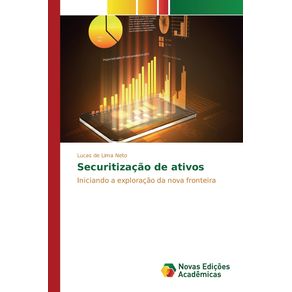 Securitização de ativos
Securitização de ativos
KS OmniScriptum Publishing
R$ 469,54 ou até 3x sem juros Vade Mecum TJPR (capa comum)
Vade Mecum TJPR (capa comum)
Editora GuedesJus
R$ 150,00 ou até 3x sem juros Vade Mecum MPPR (capa comum)
Vade Mecum MPPR (capa comum)
Editora GuedesJus
R$ 150,00 ou até 3x sem juros Mediação e Conciliação
Mediação e Conciliação
Ambra University Press
R$ 124,89 ou até 2x sem juros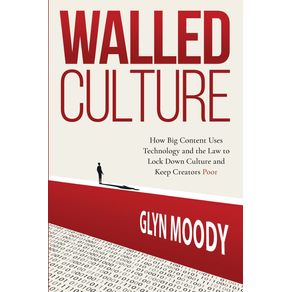 Walled Culture
Walled Culture
BTF Press
R$ 93,38 à vista LA JURISDICCIÓN CONSTITUCIONAL EN EL DERECHO VENEZOLANO
LA JURISDICCIÓN CONSTITUCIONAL EN EL DERECHO VENEZOLANO
EDITORIAL JURIDICA VENEZOLANA INTER
R$ 140,02 ou até 2x sem juros The Lawyer As CEO
The Lawyer As CEO
TORKLAW, APC
R$ 120,05 ou até 2x sem juros Aspectos jurídicos internacionais das actividades da OCDE
Aspectos jurídicos internacionais das actividades da OCDE
KS OmniScriptum Publishing
R$ 327,55 ou até 3x sem juros Código Penal Português
Código Penal Português
Books on Demand
R$ 153,89 ou até 3x sem juros Políticas públicas e Análise Econômica do Direito
Políticas públicas e Análise Econômica do Direito
KS OmniScriptum Publishing
R$ 348,77 ou até 3x sem juros SERIAL KILLER NÃO É O VIOLENTADOR, É A VÍTIMA
SERIAL KILLER NÃO É O VIOLENTADOR, É A VÍTIMA
KS OmniScriptum Publishing
R$ 262,03 ou até 3x sem juros Create Contracts Clients Love - The Workbook Sidekick
Create Contracts Clients Love - The Workbook Sidekick
Checklist Legal
R$ 102,49 ou até 2x sem juros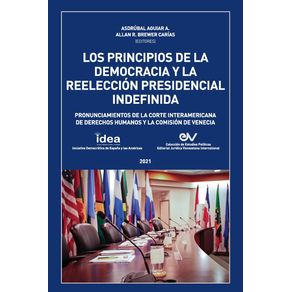 LOS PRINCIPIOS DE LA DEMOCRACIA Y LA REELECCION PRESIDENCIAL INDEFINIDA. Pronunciamientos de la Corte Interamericana de
LOS PRINCIPIOS DE LA DEMOCRACIA Y LA REELECCION PRESIDENCIAL INDEFINIDA. Pronunciamientos de la Corte Interamericana de
EDITORIAL JURIDICA VENEZOLANA INTER
R$ 398,68 ou até 3x sem juros Decision According to Law
Decision According to Law
W. W. Norton
R$ 104,04 ou até 2x sem juros LIBRO HOMENAJE AL DOCTOR PEDRO NIKKEN, TOMO I
LIBRO HOMENAJE AL DOCTOR PEDRO NIKKEN, TOMO I
EDITORIAL JURIDICA VENEZOLANA INTER
R$ 258,18 ou até 3x sem juros Donor-Advised Funds
Donor-Advised Funds
Dorrance Publishing
R$ 126,10 ou até 2x sem juros Vade Mecum DPE-MG (2ª Edição)
Vade Mecum DPE-MG (2ª Edição)
Editora GuedesJus
R$ 120,00 ou até 2x sem juros Vade Mecum de Súmulas e Ojs: STF-STJ-TST-TSE-STM-TCU-TNU-CNMP
Vade Mecum de Súmulas e Ojs: STF-STJ-TST-TSE-STM-TCU-TNU-CNMP
Editora GuedesJus
R$ 120,00 ou até 2x sem juros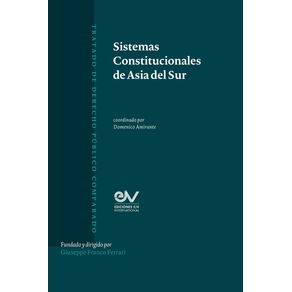 SISTEMAS CONSTITUCIONALES DE ASIA DEL SUR
SISTEMAS CONSTITUCIONALES DE ASIA DEL SUR
EDITORIAL JURIDICA VENEZOLANA INTER
R$ 184,65 ou até 3x sem juros A Digest of the Law of Evidence
A Digest of the Law of Evidence
Legare Street Press
R$ 331,21 ou até 3x sem juros Originalism as Faith
Originalism as Faith
Cambridge University Press
R$ 220,07 ou até 3x sem juros Oeuvres Complètes De Pothier
Oeuvres Complètes De Pothier
Legare Street Press
R$ 275,14 ou até 3x sem juros The Lawyer As CEO
The Lawyer As CEO
TORKLAW, APC
R$ 120,05 ou até 2x sem juros The Critical Legal Pocketbook
The Critical Legal Pocketbook
Counterpress
R$ 219,16 ou até 3x sem juros Create Contracts Clients Love - The Workbook Sidekick
Create Contracts Clients Love - The Workbook Sidekick
Checklist Legal
R$ 102,49 ou até 2x sem juros Mesenteric Embolism and Thrombosis
Mesenteric Embolism and Thrombosis
Legare Street Press
R$ 134,75 ou até 2x sem juros Barriers to Conflict Resolution
Barriers to Conflict Resolution
W. W. Norton
R$ 154,65 ou até 3x sem juros PACTO ANTENUPCIAL SEGUNDO A TEORIA DO NEGÓCIO JURÍDICO
PACTO ANTENUPCIAL SEGUNDO A TEORIA DO NEGÓCIO JURÍDICO
Lulu Press
R$ 92,51 à vista LIBRO HOMENAJE AL DOCTOR PEDRO NIKKEN, TOMO II
LIBRO HOMENAJE AL DOCTOR PEDRO NIKKEN, TOMO II
EDITORIAL JURIDICA VENEZOLANA INTER
R$ 342,38 ou até 3x sem juros The Art of Adjusting
The Art of Adjusting
Tilting At Windmills Press
R$ 219,25 ou até 3x sem juros Donor-Advised Funds
Donor-Advised Funds
Dorrance Publishing
R$ 126,10 ou até 2x sem juros